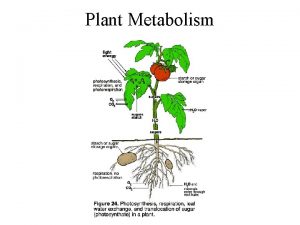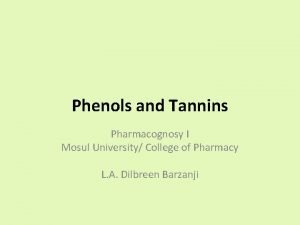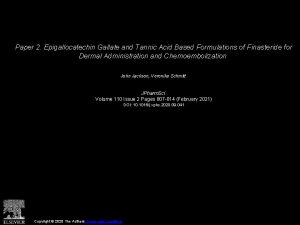Tannins Tannins commonly referred to as tannic acid






- Slides: 6

Tannins

Tannins (commonly referred to as tannic acid) are water -soluble polyphenols that are present in many plant foods. They have been reported to be responsible for decreases in feed intake, growth rate, feed efficiency, net metabolizable energy, and protein digestibility in experimental animals. Therefore, foods rich in tannins are considered to be of low nutritional value. However, recent findings indicate that the major effect of tannins was not due to their inhibition on food consumption or digestion but rather the decreased efficiency in converting the absorbed nutrients to new body substances.

Tannins Incidences of certain cancers, such as esophageal cancer, have been reported to be related to consumption of tannins-rich foods such as betel nuts and herbal teas, suggesting that tannins might be carcinogenic. However, other reports indicated that the carcinogenic activity of tannins might be related to components associated with tannins rather than tannins themselves. Interestingly, many reports indicated negative association between tea consumption and incidences of cancers. Tea polyphenols and many tannin components were suggested to be anticarcinogenic.

Tannins Many tannin molecules have also been shown to reduce the mutagenic activity of a number of mutagens. Many carcinogens and/or mutagens produce oxygen-free radicals for interaction with cellular macromolecules. The anticarcinogenic and antimutagenic potentials of tannins may be related to their antioxidative property, which is important in protecting cellular oxidative damage, including lipid peroxidation. The generation of superoxide radicals was reported to be inhibited by tannins and related compounds.

Tannins in Obesity Results of the present study show that both of the studied Plumbago species consist of bioactive compounds that can act as lipase inhibitors and therefore can be useful for the development of functional foods against obesity. It can also be used as a source of lead compounds for designing new antiobesity drugs. Further isolation, identification, and characterization of phyto-active compounds responsible for antiobesity action are required to evaluate the full therapeutic potentials of these plants.

Tannins in Obesity Tannic acid prevented the differentiation of 3 T 3 -L 1 pre-adipocytes, and thus repressed intracellular lipid accumulation. Since FAS was believed to be a therapeutic target of obesity, these findings suggested that tannic acid was considered having potential in the prevention of obesity.











